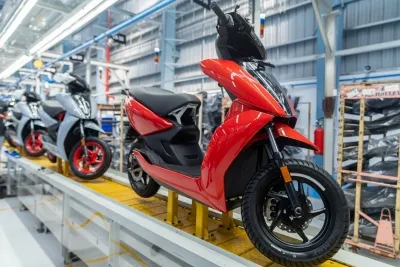Ather Energy Faces Stagnant Revenue and Rising Losses Ahead of IPO

Synopsis
Key Takeaways
- Ather Energy is launching an IPO on April 28.
- It has reported losses each year since its founding.
- The pre-tax loss for FY24 was ₹1,059.7 crore.
- Its revenue for FY24 decreased slightly to ₹1,753.8 crore.
- The IPO includes an offer for sale worth ₹355 crore.
New Delhi, April 25 (NationPress) The electric two-wheeler manufacturer Ather Energy is gearing up to unveil its initial public offering (IPO) on April 28. However, industry analysts expressed concern on Friday regarding the company's persistent losses and stagnant revenue growth.
Despite being among the pioneers in India’s electric vehicle market, Ather has yet to report any profits since its inception in 2013, founded by Tarun Mehta and Swapnil Jain.
The firm’s red herring prospectus (RHP) indicates that it has incurred losses annually, raising doubts about its ability to achieve cost-effectiveness or profitability in the near future.
In the fiscal year 2023–24, Ather Energy posted a pre-tax loss of ₹1,059.7 crore, a significant rise from its ₹864.5 crore loss in FY23 and ₹344.1 crore in FY22, highlighting a widening gap in its financial status.
Simultaneously, its revenue for FY24 was recorded at ₹1,753.8 crore, slightly down from ₹1,780.9 crore in FY23.
The forthcoming IPO, valued at ₹2,981 crore, includes an offer for sale (OFS) of shares amounting to ₹355 crore. The co-founders of Ather plan to divest 19.6 lakh shares, potentially reaping substantial profits.
Their average acquisition cost for shares was merely ₹21.09 each. If the IPO is priced at the upper limit of the ₹304-321 range, they could realize gains exceeding 1,400%, despite the company not being profitable.
Although Ather was among the first to introduce electric scooters in India in 2018, it trails behind larger competitors like Ola Electric, which is also encountering challenges in the market.
The IPO will be open for subscription until April 30, with shares to be listed on the Bombay Stock Exchange (BSE) and NSE.
Nonetheless, the company’s difficulties in scaling amidst intense competition raise critical questions about its business model and future prospects.










